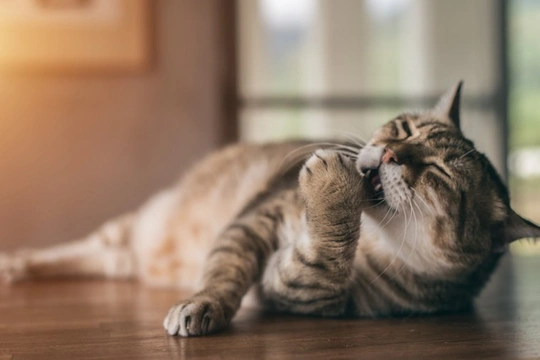
Cat myths corrected: Cats moderate their own food intake and don’t overeat
Cat myths corrected: Cats moderate their own food intake and don’t overeat
Is it true that cats don’t overeat like dogs are apt to, as they naturally moderate their own food intake and stop eating when they’re full? Not always! After all, it’s not as if there are no cat cats.
Free feeding or providing free access to food is natural for cats, and generally works well, but if your cat is overweight you need to address why this is, and this means identifying the cause.
The idea that cats never overeat is a myth, and this article will share the truth behind it, and some important information on the factors that can cause weight gain and overeating in cats. Read on to learn more.
Would you even know if your cat was too fat?
Have you ever seen a fat cat? Yes, everyone has! You don’t tend to see as many overweight cats as you do dogs, but every neighbourhood has at least one and often more chunky felines, and some places have a cat or cats that are undeniably outright fat.
As is the case with dogs too, a lot of people cannot actually identify a healthy weight and build in a cat, because we’re so used to seeing cats/dogs that are, to put it very politely, a bit rounded around the edges.
This effect is again more acute with dogs and dog owners, to the point that many people think ideal-weight examples of dogs of some breeds are actually underweight or too lean, so used are we to seeing fat dogs that we think this is the norm.
Cats shouldn’t be visibly thin; but healthy weight cats, particularly when younger, tend to have a fairly lithe and lean appearance. As they age and become a little less active, they fill out somewhat, which is fine – but not the same thing a being overweight.
Does free feeding encourage overeating in cats?
Not in and of itself, no. At least, not in most situations for most cats.
We tend to free-feed cats, and this is natural to their feeding patterns of eating little and often. However, cats can and sometimes do overeat, or eat more than is commensurate with their energy levels, so if your cat is overweight don’t just ignore this!
You may need to switch them to a lower calorie food, cut down on the treats, or ration their food intake to small portions several times a day, or encourage them to play and be more active; or all of these things.
Bulk and caloric value are not always commensurate
Another factor to bear in mind is that having a full stomach isn’t always commensurate with the amount of calories in things; we’d feel full on a stomach full of veggies just as we would with a stomach full of crisps and sweets, but the latter has far more calories than the former. This means that treats will not make your cat feel full and stop eating, but can make them overweight nonetheless.
Quality food requires less quantity
The quality of a cat’s food plays a part in the nutritional value and sense of fullness they get from it too. Cats are obligate carnivores, which means that they cannot be fed a vegetarian or vegan diet – dogs, in theory, can be, although this is rather questionable in terms of imposing human values onto another species.
Many cat foods, particularly those at the lower end of the quality and price spectrum, contain grains and bulking agents, commonly things like wheat. Cat foods that are marketed as being grain free often make cat owners assume that these don’t contain bulking agents and are instead comprised of only essential meat proteins and vegetables; but often, they use rice instead, which is not a grain but is still a bulking agent providing no nutritional value to cats.
This means that these bulking agents can make the cat feel full and yet also potentially cause weight gain if they eat too much, but they don’t fulfil your cat’s nutritional requirements; they’re usually nothing more than empty calories, and can result in weight gain as those excess calories are stored as body fat, and bigger poops, as the body doesn’t utilise them effectively!
Feeding your cat a food that doesn’t contain bulking agents can definitely cost more like for like per bag or sachet of food. However, the amount of it your cat needs to eat is lower as their bodies can use more of it; and so the price difference is often far less acute than it may seem in terms of how much feeding your cat costs each month.
One thing to factor in if you make such a transition though is that at first, even cats that are good at stopping eating when they feel full will be used to eating more, and so may continue to do so; which can result in weight gain.
Phase in a change in food gradually over time to minimise this effect, and keep an eye on your cat’s weight.
If your cat seems to have gained weight suddenly or abruptly changed their activity levels, or if there are any other changes or symptoms, contact your vet to ensure there’s nothing amiss.



